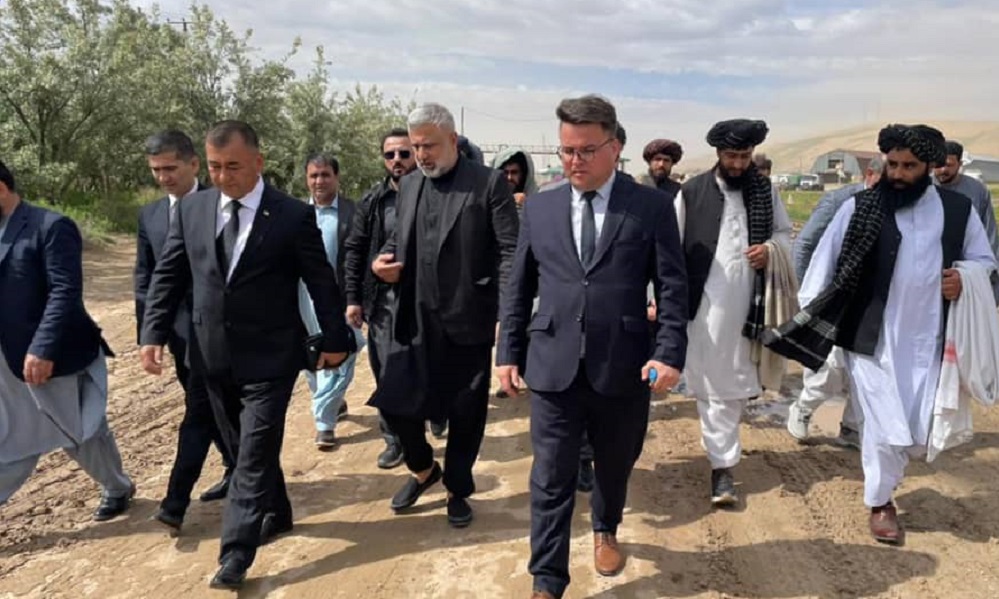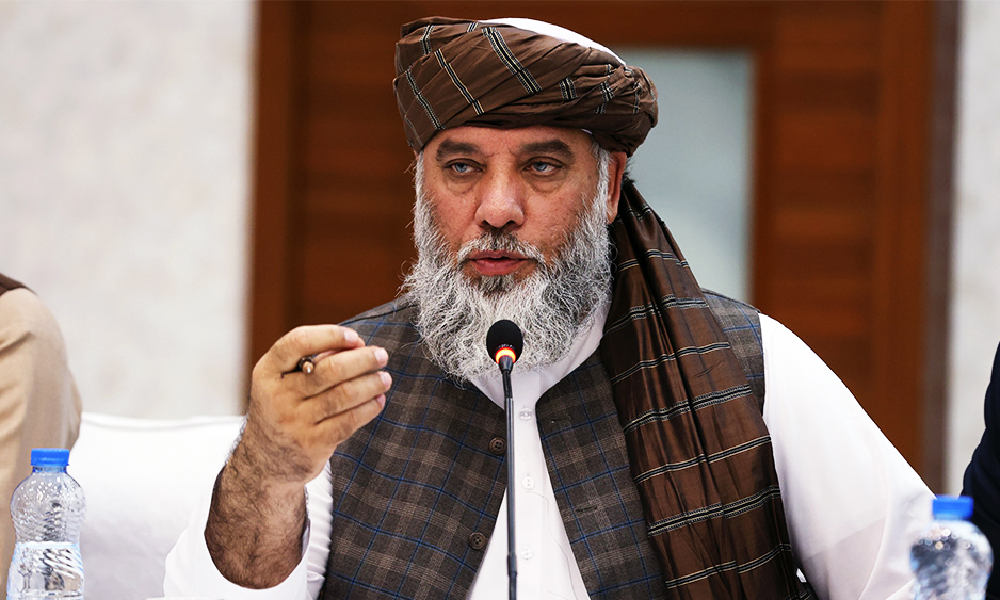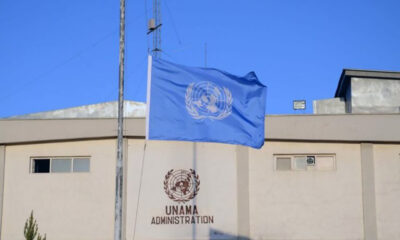Business
US-Afghan Gov’ts failed to achieve Joint goals: SIGAR

Today, the Special Inspector General for Afghanistan Reconstruction, John F. Sopko, testified before the United States House Committee on Armed Services Subcommittee on Oversight and Investigations. Unfortunately, SIGAR’s cumulative work to date has shown that TFBSO’s nearly $800 million investment in Afghanistan has generally not delivered on its stated goals.
The compressed natural gas (CNG) filling station and a cashmere goat’s project are glaring examples of TFBSO activities SIGAR has examined that were ill-conceived, poorly planned, or left unfinished. Further, it appears that TFBSO’s activities in Afghanistan were stymied by
several avoidable problems and repeated mistakes from its Iraq experience that hindered Task Force operations and outcomes.
Inspector General Sopko noted that DOD’s Task Force for Business and Stability Operations (TFBSO) efforts in Afghanistan were marred by the absence of a clear strategy, a lack of consistent management and leadership, and a failure to coordinate with other U.S. government agencies.
TFBSO’s lack of strategic direction and inconsistent management resulted in a scattershot approach to economic development resulting in an $800 million investment in Afghanistan that has generally not delivered on its stated goals.
Mr. Sopko has stated that My testimony today will broadly discuss TFBSO’s challenges with project development, execution, and oversight, and, at the request of the Chairwoman, will focus on three TFBSO expenditures that illustrate these challenges:(1) nearly $150 million for private housing and private security guards for TFBSO personnel in Afghanistan; (2) $43 million for a CNG filling station; and (3) $6 million on a project to bolster Afghanistan’s cashmere industry..
Poor policy coordination in between the Afghan and US Governments have caused the following projects to be wasted in Afghanistan.
“Based on our previous reports published indicated that poor coordination in between the US- Afghan Government including the Ministry of Foreign affairs and USAID have caused that the following Governments failed to achieve the goals on extraction of mineral sources, Gas, Oil in Afghanistan, the Special Inspector General for Afghanistan Reconstruction, John F. Sopko said,”
The following poor coordination in between the two Governments comes after that corruption in Afghanistan is huge challenges standing against the Afghan Government and International community.
Reported by Fahim Noori

Business
Afghanistan’s Turkey-bound goods via rail cross Tehran

Ten wagons of Afghanistan’s goods bound for Turkey have passed through Tehran and are now on the way to the Razi border in northwest Iran, local media reported on Monday.
IRNA news agency, citing the Ministry of Roads and Urban Development of Iran, said that Afghanistan Rail Development Consortium dispatched the consignment without going through legal procedures, including obtaining permits from border guards and customs, as well as without obtaining permission from the Iranian Railway Authority.
It said that Iran allowed the passage of the consignment considering its national interests and with goodwill.
Iranian officials announced that they will allow the next trade consignment from Afghanistan to transit through the country only after the necessary permits from relevant authorities have been obtained.
Business
Turkmenistan business delegation visits Herat

Nokerguly Atagulyev, the head of the Union of Industrialists and Entrepreneurs of Turkmenistan, has visited Herat province for trade talks, the Ministry of Industry and Commerce announced on Saturday.
The ministry said in a statement that the purpose of the Turkmen delegation’s visit is to help reduce Afghanistan’s trade deficit, to foster commercial and economic cooperation, examine Afghanistan’s proposal for the supply of construction materials, especially marble and iron bars and for the growth of trade and transit between the two countries.
The delegation is also expected to meet with officials and private sector representatives, and visit commercial and industrial sites of Afghanistan, especially in Herat province.
The visit comes after Nooruddin Azizi, Acting Minister of Industry and Commerce’s trip to Turkmenistan. The aim is to open the first Afghan-Turkmen Business Forum and discuss the import of construction materials, especially marble and iron bars from Afghanistan.
Business
IEA plans regional energy trade hub with Russian oil in mind

The Islamic Emirate of Afghanistan (IEA) has agreed with Kazakhstan and Turkmenistan to build a logistics hub in western Afghanistan aimed at making the war-torn nation a major logistics point for regional exports, including oil from Russia to South Asia, the country’s commerce minister said.
Following a meeting between representatives of the three countries in the Afghan capital last week, IEA’s acting commerce minister Nooruddin Azizi told Reuters that technical teams would draw up a written agreement within two months on the formal plans for the hub, which all three countries would invest in after six months of talks.
As foreign aid to Afghanistan falls and the predominantly agricultural economy is marred by persistent drought, its officially unrecognised IEA government has faced questions over how to fund development and avoid economic stagnation, Reuters reported.
Azizi said the new hub was part of broader efforts to take advantage of Afghanistan’s strategic location, once a thoroughfare for the ancient Silk Road trade route, lying between South and Central Asia and sharing borders with China and Iran.
“Based on our discussions, a logistics centre is going to be established in Herat province, which can connect the north to South Asia,” Azizi said, adding that the Taliban (IEA) was eyeing the millions of tons of oil they expected Russia would be selling in coming years to South Asian countries, particularly Pakistan, to pass through the new hub.
“The three countries have done their best to prove Afghanistan’s claim as a connectivity point,” he said.
“Reaching Pakistan through Afghanistan will be the best option,” Azizi added, saying they were focused on Russia’s petroleum exports and that Kazakhstan was also planning to export goods through Herat into South Asian markets.
Kazakhstan’s trade ministry said in a statement to Reuters that it wanted to develop roads and a railway through Afghanistan to connect with South Asia and the Gulf, with the hub serving as an important logistics point.
“The creation of the hub will allow for the development of multi-modal services by consolidating truck shipments in the dry port where they will be sorted and sent along railroads on the North-South corridor to sea ports in the Gulf, Pakistan, and Indian Ocean, towards India,” the statement said.
Azizi said the logistics hub’s initial capacity would be one million tons of oil but he did not give a date for when it would be operational.
Turkmenistan’s government did not immediately respond to a request for comment and the Russian government did not respond to a request for comment during a national holiday.
Pakistan’s foreign office and energy minister did not respond to a request for comment. Pakistan is a major trading partner with Afghanistan and has signed on to regional energy connectivity agreements, Reuters reported.
However, Islamabad has had strained relations with the IEA in recent years over accusations Afghanistan is harbouring anti-Pakistan militants, which Kabul denies.
Cash-strapped Pakistan last year became Russia’s latest customer, snapping up discounted crude that has been banned from European markets due to Russia’s war on Ukraine.
Afghanistan also buys oil, gas and wheat from Russia at discounted rates.
Azizi said that the IEA was also speaking with Chinese authorities on building a road through the remote, narrow Wakhan corridor that connects Afghanistan with China and that they hoped Afghanistan would eventually develop into a route for trade between China and Iran. He said Afghan commerce ministry officials had been recently been sent to China for training.
-

 Sport4 days ago
Sport4 days agoSorkh Poshan Khafi and Khadim FC winners in their ACL matches
-

 Latest News5 days ago
Latest News5 days agoUNAMA issues latest rights report, notes ongoing challenges for women, girls and media
-

 World4 days ago
World4 days agoWhy Palestinians can count on American students but not Arab allies to protest
-

 Sport4 days ago
Sport4 days agoAbu Muslim and Attack Energy win in ACL matches
-

 Sport4 days ago
Sport4 days agoBairstow, Rossouw help Punjab beat Chennai in IPL
-

 Sport4 days ago
Sport4 days agoFour Afghans included in Refugee Olympic Team for Paris 2024
-

 World4 days ago
World4 days agoCalifornia police flatten pro-Palestinian camp at UCLA, arrest protesters
-

 Latest News4 days ago
Latest News4 days agoFive dead, 24 injured in traffic accident in Samangan
















